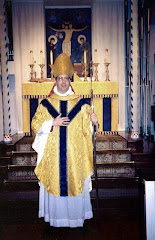 Archbishop Sako shown above
Archbishop Sako shown aboveAP
By YAHYA BARZANJI, Associated Press Writer Yahya Barzanji, Associated Press Writer – Mon Apr 27, 2:58 pm ET
KIRKUK, Iraq – At two Christian homes, the gunmen used the same methods: point-blank fire that claimed three lives in a 30-minute span. The attacks left another outpost of Iraq's dwindling Christian community frightened Monday that it could become caught in the struggles over disputed Kirkuk.
"Innocent people who have no relation with politics and never harmed anyone were killed by terrorists in their homes just because they were Christians," Chaldean Archbishop Louis Sako told more than 600 mourners in this ethnically mixed city 180 miles north of the capital.
The motives behind the late Sunday attacks remained unclear, with suspicions mostly falling on Sunni insurgents linked to al-Qaida in Iraq.
But fear of reprisals and worries about vulnerability have become common themes for members of one of the world's oldest Christian homelands.
Iraq's Christians, who numbered about 1 million in the early 1980s, are now estimated at about half that as families flee warfare and extremist attacks that target their churches and homes.
The future of Kirkuk — an ethnic patchwork led by Kurds and Arabs — has become one of the most politically sensitive issues for Iraqi leaders and for U.S. military commanders preparing to withdraw their troops by the end of 2011.
The city is the hub of Iraq's northern oil fields and a key prize for both Kurds and the central government in Baghdad. The showdown is so volatile that Kirkuk was excluded from regional elections in January and the United Nations has offered a proposal for compromise plans.
Caught in between are the smaller communities of ethnic Turks and Christians, including the ancient branches of Chaldean and Assyrian churches and smaller communities such as Roman Catholics and Orthodox.
Speaking to mourners at Kirkuk's main Chaldean church, Sako blamed political leaders for failing to reach compromises on the many ethnic and political disputes.
"It seems that violence is coming back and they lost that chance," he said.
Two of the victims were Chaldean Christians; the other was Assyrian. Family members said all would be buried in their home areas around Mosul, Iraq's third-largest city 225 miles northwest of Baghdad.
Kirkuk police Lt. Col. Anwar Qadir said the slayings appeared to be an attempt by al-Qaida to spark sectarian clashes or scare away the more than 10,000 Christians remaining around Kirkuk.
In the past, insurgents have described Iraq's Christians as "crusaders" whose true loyalty lies with U.S. troops and the West.
On Monday, round-the-clock security patrols and checkpoints were increased around Christian areas.
Christians in the Mosul area have faced the brunt of attacks, including a string of bombings and execution-style slaying in late 2008 blamed on Sunni insurgents. An estimated 3,000 Christians fled the area in a single week.
In March 2008, the body of Mosul's Chaldean Archbishop, Paulos Faraj Rahho, was found in a shallow grave — a month after he was kidnapped at gunpoint as he left a Mass.
Kirkuk, however, has not been spared. In January 2006, two churches here were bombed as part of a series of coordinated attacks that also targeted the Vatican's diplomatic mission in Baghdad.
"If we can't feel protected, then more Christians will leave Iraq," said the Rev. Giorgos Alywa, an Assyrian Orthodox cleric at the burials in the Mosul area.
The first assault killed a woman and her daughter-in-law. About a half-hour later, gunmen killed a 27-year-old man in another part of the city, said Qadir.
Eman Latif, the sister of the younger woman killed, said the attacker stabbed the victims after they were gunned down.
"What have they done to be treated like this?" she said.
Last week, U.N. representatives gave Iraqi leaders a report outlining suggestions to ease sectarian tensions in Kirkuk, including a proposal to grant the area "special status" that would allow joint oversight by both the Kurdish region and the central government in Baghdad.
Kirkuk "should be solved through political, diplomatic channels and dialogue. There is a chance to solve it," the top U.S. commander in Iraq, Gen. Raymond Odierno, said Monday in an interview with Iraq's Al-Sharqiya television.
But a Christian university student in Kirkuk, Rudi Shammo, said there is a different reality on the streets: "We Christians in Kirkuk have no weapons or militias to protect us."
Still, he plans to take a stand.
"Some groups may have plans to push us out of our own country, but I say we will not leave Iraq," he said. "This will not happen."

























